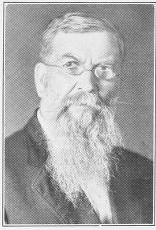Greenberry G. Rupert
| Greenberry George Rupert | |
|---|---|
 |
|
| Born |
May 12, 1847 Ohio, U.S. |
| Died | July 17, 1922 (aged 75) Oklahoma City, OK |
| Residence | Oklahoma City |
| Occupation | Evangelist author |
| Known for | evangelism |
| Title | Pastor of the Independent Church of God |
| Successor | John S. Stanford |
| Children | Harry. W. Rupert, Eva Josephine Rupert Pennington, Lucile Rupert Smith, Lauretta Rupert Pennington, Ruth Rupert Bulla |
| Relatives | daughter-in-law: Birdie Stuart Rupert Sultz. She married one of his successors, Ivel Sultz, in 1957. |
Greenberry George Rupert (1847-1922), generally known as G. G. Rupert, was an American Adventist pastor and writer associated with British Israelism and Dispensationalism. He published a number of books which attempted to interpret history from a biblical literalist and millenarian perspective. Rupert's theories were a seminal influence on the 20th-century evangelist Herbert W. Armstrong. His religious ideology was linked to a theory that the Last Days would see a power struggle between the "Orient" and the "Occident", a view that helped to fuel the Yellow Peril panic.
Born in Ohio, Rupert was initially a Methodist, but later joined the Seventh-day Adventists, becoming a minister for a number of years. He then formed the "Independent Church of God", which was loosely associated with the Adventist Church of God. Based in Britton, near Oklahoma City, from 1917 he published the journal Remnant of Israel, setting forth his views.
Rupert became the head of a number of churches, with generally small followings. These continued to function for a few years after his death led by his close associate John S. Stanford and Rupert's own son and daughter.
Rupert believed that the New Testament had not superseded the rules laid out in the Old Testament, and so the laws of Moses should apply to Christians as well as Jews, including kosher diets and other practices. Adapting the Adventist view of Seven church eras, Rupert argued that the "Philadelphia" phase was the period in which William Miller worked (from 1833 to 1844). The final era, "Laodicea" began in 1844 and would last until the End Times. He also denied the immortality of the soul, asserting that man is mortal, but can be given eternal life. Traditional Christian holidays were in fact "heathen":
Sunday...Easter, Christmas, Good Friday, Ash Wednesday, and various days...are all of heathen origin and belong to Babylon, the mother of harlots. The majority of teachers know this, but for various reasons they will still try to keep the people in ignorance and support the old system of Babylon.
...
Wikipedia
